
by Sandra Gulland | Apr 1, 2018 | Adventures of a Writing Life, Podcasts, Promotion, Resources for Writers, Young Adult Literature |
I’ve become very fond of a podcast about Young Adult lit called Kidlit Drink Night. They always make me laugh and I end up making lots of notes about books, movies and TV series to look into. They call themselves “Superfriends,” which is sweet. There is a lot of laughing. They share a love of YA Lit, and an often bizarre drink for the night, which is not always met with approval. :-) They end their once-a-month sessions with the question, “What are you crushing on?” I love that.
So: What am I crushing on right now? (Other than the Kidlit Drink Night podcast.)
So: what are you crushing on?

by Sandra Gulland | Jan 23, 2015 | Adventures of a Writing Life, On Research, Resources, Resources for Writers, The Writing Process |
My husband and I have been staying in one of our favourite spots, a Solecito casita on beautiful Playa Blanca on the Mexican Pacific coast. (Our casita: the one shown above.)
It’s a totally relaxing time for us, and—surprisingly—one of the pleasures, for me, is that I get quite a bit done:
• I edited the 4th draft of The Game of Hope and began draft 5.
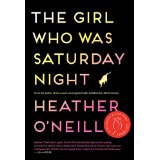
• I read a lot, likely because I’m reading on my little Kindle, and not on the Kindle app on my Net-connected iPad.
• I finished THE BOOK OF STRANGE NEW THINGS by Michel Faber (my first Sci-Fi), and am close to finishing THE GIRL WHO WAS SATURDAY NIGHT by Heather O’Neill. (Delightful! I have previously read and very much enjoyed LULLABIES FOR LITTLE CRIMINALS.) I’m still reading and highly recommend Publishing 101 by Jane Friedman as well as various research books.
• I read a pdf of wonderful novel that I gave a rave quote for … I’ll have more to say on this book when it is published in March.

• I listened to a wonderful audible recording of ALL THE LIGHT YOU CANNOT SEE, a novel by Anthony Doerr that was on virtually every “best of 2014” book list.
Coursera.org: How to Learn
I caught up on the video lectures of a Coursera course I’m taking on how to learn. (You can watch them here.)
Why am I following this course? Because I am determined to become more conversant in both French and Spanish. (In fact, as I go for my daily walk on the beach, I listen to French tapes.)
My research method
This course has got me reconsidering my writing research method. I used to write notes out by hand. Now I prefer highlighting passages on Kindle and sending these to Evernote—knowing that I can always find the information should I need it.
Effortless! Right?
Not exactly. Evernote is great, but the trouble is: when I look for something on Evernote, I find the mass of notes overwhelming. It’s not that functional system for me, in truth, and I’ve long had a hunch that writing down notes by hand was more effective. This Coursera course has confirmed the importance of approaching information through different media.
Another problem I have is resistance to organizing my research. I’m content to cruse the Net, buy new books, read and highlight them, but I’m somewhat scattered and slapdash about it, in truth.
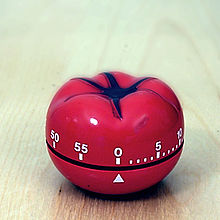
This course has reminded me of the value of the Pomodoro approach: setting a timer for 25 minutes of focussed distraction-free (i.e. Net-free) period of time.
It has also reminded me of the key importance of review: and this is where note-taking comes in.
The course also emphasises how important relaxation is to learning. And so … to the hammock.
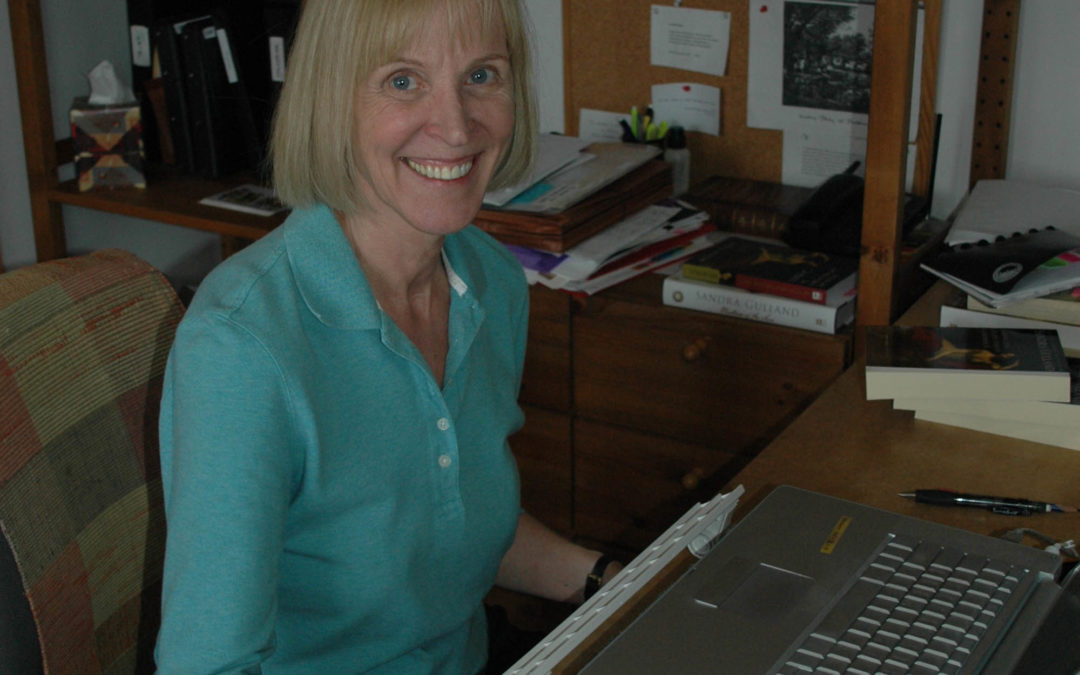
by Sandra Gulland | Oct 25, 2013 | Adventures of a Writing Life, The Game of Hope, The Writing Process, Work in Process (WIP) |
Today is my last day in “the bunker”—my lovely basement office in our Ontario home. I have another lovely office awaiting in Mexico, but this one (shown above) is my favourite, and I always feel a little sad leaving.
It’s said that “home is where your books are,” and that makes this place home: we’ve books everywhere here.
As soon as I finish this post, I will close the door on this office until next spring. I’ve tidied it well this year.
On the 1st of November, a little jet-lagged and travel weary, I will unpack my lovely office in San Miguel de Allende, Mexico.
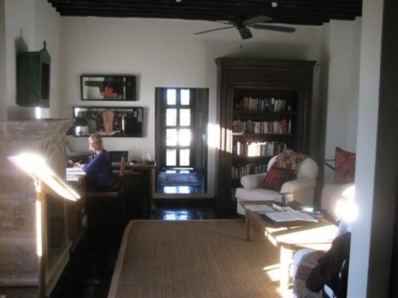
As soon as I have my printer up and running, I will print out THE GAME OF HOPE (working title of The Next Novel). I’ve been thinking about it a lot and am ready to plunge into the next draft.
Other things going on:
I’ve enrolled in Witches, Plagues, and War, a free on-line course in Historical Fiction, offered through amazing Coursera.org. There are over 15,000 enrolled worldwide. Mind-boggling.
But the main thing is the quality: the course is fantastic. I’m learning and loving it.
Check out all the other Coursera offerings: are they not amazing? I want to drop out and go to school! I want to work toward that long-ago impossible dream of getting a PhD in Comparative Lit!
Maybe when I’m 80 …
by Sandra Gulland | Oct 16, 2013 | Adventures of a Writing Life |
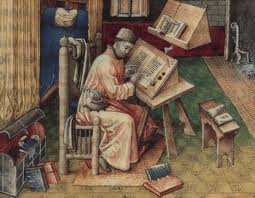
I’ve enrolled in “Plagues, Witches, and War”—a free on-line Coursera class on historical fiction. It’s awesome! I’m busy right now preparing for our move south, but I always have time for reading. You can see the course reading list here.
I read two of the “core” articles yesterday, both of them excellent, ones I would recommend to anyone interested in historical fiction.
Here’s from the excellent article by Ian Mortimer (who is both an academic, and writer of historical fiction under the name James Forrester), on “Why Historians should Write Fiction“:
“It teaches you how little you really know about the minutiae of the past, and destroys professional complacency. It humbles even the most experienced researcher. It demands that you think deeply about human character, and how it is formed, and how people integrate. But most of all it shows you that there is a different sort of truth beyond the measurements of facts and dates: truths about human nature which are timeless, or, at least, very slow-moving. And it leaves you thinking that these truths, although they are unproveable, are probably the most important historical conclusions of all, for they reflect what we are, and what we can be, both as individuals and as a society.”

The other article is a New Yorker profile of Hilary Mantel: “The Dead are Real.” It moved me profoundly.
Mantel on character development
Right now, between drafts, I’m often simply thinking and making notes about Hortense and her world, exploring character. A technique Mantel sometimes uses for getting to know her characters interests me:
“When she’s starting a new book, she needs to feel her way inside the characters, to know what it’s like to be them. There is a trick she uses sometimes, which another writer taught her. Sit quietly and withdraw your attention from the room you’re in until you’re focussed inside your mind. Imagine a chair and invite your character to come and sit in it; once he is comfortable, you may ask him questions.”
(A technique which dovetails nicely with another “course” I’m taking, on learning to meditate.)
Mantel on making changes to the historical record
The following passage reverberated for me especially because I recently had to sort out quite a tangle in THE SHADOW QUEEN because I had tightened the narrative timeline for dramatic purposes.
“She couldn’t always be sure that a character was in the place she said he was in at the time she put him there, but she spent endless hours making sure that he wasn’t definitely somewhere else. “Once you play around with history, it trips a whole load of consequences,” she says.”

Mantel on a certain type of writer’s block
This passage expresses a fear I often have, and most writer have as well:
“I don’t think one ever quite learns to trust the process,” she says. “I feel, What if I wake up tomorrow and I can’t do it anymore? I know I’ll always be able to write, in the sense of having a robust style that’s sufficient to the occasion, and I know that books can be got onto the page by craft, but the thing that makes a phrase that fizzes on the paper—you always fear that may not be there any longer, because, after all, you did nothing to deserve it. You did nothing to contrive it. It’s just there. You don’t understand it, it’s out of your control, and it could desert you.”
Fortunately, I’m not a writer of phrases that fizz, but there is a certain passion and energy that one brings to a story and I do worry about fatigue. The cure for that, for me, is invariably research and inspiring reading. I’ve chosen to read A Tale of Two Cities by Charles Dickens for the class: such a passionate writer!











